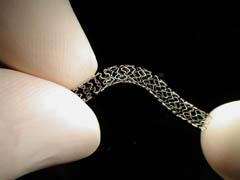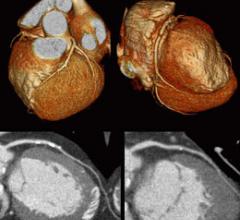
In the world of endovascular devices, the rule is no longer one size fits all. The recent increase in the variety of stents for percutaneous coronary intervention (PCI) offers the physician of a patient with coronary artery disease (CAD) the ability to tailor treatment to the individual patient, rather than tailor the patient to the therapy.
August 26, 2010 – Analysis and quantification tools for 2-D, 3-D and 4-D data from a wide range of echocardiography systems will be added to Agfa's Impax Cardiovascular Picture Archiving and Communication System (PACS).
August 25, 2010 – Alleging infringement of a patent for its transcatheter cardiac septal occluder devices, AGA Medical Holdings Inc. said it filed a lawsuit against W.L. Gore & Associates.
Cardiac PET/CT represents a major advancement in cardiovascular diagnostics, offering significant clinical and ...
August 25, 2010 – There will be special tracks available for nurses and technologists and for the transcatheter treatment of patent foramen ovale (PFO) during the Transcatheter Cardiovascular Therapeutics (TCT) meeting Sept. 21-25, 2010, in Washington, D.C. TCT for Nurses and Technologists
August 25, 2010 – Evidence suggests the use of contrast agents for echocardiography is safe and not associated with a greater incidence of myocardial infarction or mortality, according to a new study published in the American Journal of Cardiology (vol. 106, issue 5, pages 742-747, Sept. 1, 2010.)
August 24, 2010 - Ziosoft Inc. announced a new financing option at the American Healthcare Radiology Administrators (AHRA) annual conference, held in the Washington, D.C., area Aug. 23 - 25, 2010.
SPONSORED CONTENT — Studycast is a comprehensive imaging workflow system that allows healthcare professionals to work ...
August 24, 2010 – Optical coherence tomography (OCT) evaluation of a patient with anterior ST-elevation myocardial infarction (STEMI) who received two OrbusNeich Genous Bio-engineered R stents showed 100 percent coverage of the stent struts and complete neointimal coverage 26 days post-implantation.
August 23, 2010 - New advanced 3-D capabilities comparable to those offered by dedicated advanced visualization systems are available on the latest Carestream picture archiving and communications system (PACS) platform upgrade.
August 23, 2010 – Making the most of limited space, a low-profile, height-adjustable, user-friendly, mini-workstation that folds against a wall when not in use brings computer technology to almost any location in a healthcare facility. AFC Industries Inc. introduced the Wall Mount Combo AFC78-08_12 at Association for Medical Imaging Management (AHRA) 2010 annual meeting in booth 429.
Providing exceptional cardiovascular care for patients to achieve the best possible outcomes is the number one goal for ...
August 23, 2010 - Two companies recently signed a strategic partnership agreement drawing on both firms' established expertise in imaging technology to establish computed tomography (CT) as a viable, minimally-invasive imaging alternative for many cardiovascular procedures.
August 19, 2010 – The Cardiovascular Research Foundation recently announced the late-breaking trials and first report investigations being presented at the Transcatheter Cardiovascular Therapeutics (TCT) 2010 scientific symposium. Findings from these clinical trials are expected to significantly impact interventional cardiology practices and patient care. TCT 2010 will take place Sept.

August 19, 2010 – Researchers at the University of Maryland School of Medicine in Baltimore have developed a novel 3-D imaging approach that may improve the accuracy of treatment for ventricular tachycardia (VT). The potentially life-threatening heart rhythm disorder causes the heart to beat too fast.
Cardiac positron emission tomography (PET) is growing in popularity among cardiologists because it provides the ability ...
August 19, 2010 – High-end imaging capabilities are offered in the ergonomically designed, portable Mindray premium M7 ultrasound system, being launched this week in the United States.
August 19, 2010 – The Intersocietal Accreditation Commission (IAC) this week announced the launch of its new website, at www.intersocietal.org, along with new websites for each of its specialty divisions. These include: • ICAVL for noninvasive vascular testing, www.icavl.org • ICAEL for echocardiography, www.icael.org
August 19, 2010 – A new mobile phone that provides a quick and simple way to measure, record and send vital electrocardiograms (ECGs) could help millions of people who suffer from heart-related medical conditions, claims its German inventors. The H'andy sana is a new full-featured, touch screen mobile phone that also includes an application called Heart Suite.

 August 26, 2010
August 26, 2010














